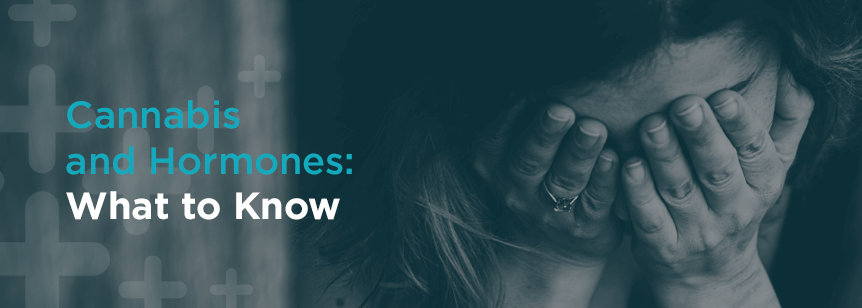
The endocrine system is the body’s network of hormone-producing glands, releasing hormones into the bloodstream that act like tiny chemical messengers that run off to tell our body what to do: grow, eat, burn energy, and reproduce.
This system of glands includes the thyroid, pineal gland, hypothalamus, ovaries, testes, and pancreas (among others)—and under normal conditions, produce hormones at a slow, regular, steady pace. However, due to factors as varied as genes, age, or environment, your body could start making too much or too little of a hormone, triggering symptoms all over the body. This is referred to as a hormone imbalance.
Common symptoms of hormone imbalance include:
Hormonal fluctuations can occur naturally to both males or females during puberty, and at various stages of life (for women this includes menopause, and perimenopause)—but they can also be caused by an unbalanced lifestyle, toxins in the environment, or even hormones in our food chain. Metabolism, appetite, reproduction, growth and development, sexual function, and mood are all connected to our hormone health.
CBD—the non-psychoactive cannabinoid derived from the hemp plant—is a chemical compound that directly interacts with the endocrine system. And though research is still ongoing, CBD oil seems to have an affect on certain processes in the body (over a dozen of them now and counting, including the nervous system and mood centers), which include hormone imbalance.
CBD may be able to help regulate our hormones, provide relief from hormonal symptoms, and, even act as a preventative measure against hormonal imbalance.
Based on the findings from several promising studies, CBD oil (also taken as capsules, drops/tinctures, edibles, or vapes) had a positive influence on the regulation of hormones and hormone-related ailments. How? With cannabinoids’ ability to interact with neurotransmitters in our brains, particularly the cannabinoid receptors CB1 and CB2. These aid in the regulation of hormone secretions and, most promisingly, the brain center responsible for our perception of pain.
Even if you didn’t buy into the scale and breadth of CBD’s healing properties, hemp oil itself is loaded with omega fatty acids like gamma linolenic acid and omega-6 fatty acid (much like in egg yolks), which has been well documented as nutritive support for hormone regulation and inflammation control.
But in addition, CBD seems to have unique properties that interact with the brain and central nervous system, producing a number of beneficial outcomes across a wide variety of physiological processes around the body—from calming anxiety, to alleviating symptoms like nausea, migraines, sleep issues, and more.
In particular, CBD seems to help in controlling the hormones insulin, cortisol, and melatonin.
Insulin is produced by the pancreas and when it gets out of whack, can cause heart disease, obesity, and diabetes. CBD oil seems to reduce the chronic inflammation of the pancreas that’s associated with insulin issues that can lead to diabetes. Cortisol, a no less important hormone, can keep our bodies in a stressed-out state (well after our minds have moved on). CBD oil may be able to help lower cortisol levels in the blood, helping the body and mind relax, keep your mood in check, reduce anxiety, and allow you to fall asleep more easily. And finally, CBD oil may also be able to improve your sleep quality by keeping the hormone melatonin in check as well, by promoting your natural circadian rhythms, helping you fall asleep, and stay asleep, and improve sleep quality.
Hormones play a huge role throughout a woman’s life, with temporary, expected hormone imbalances during puberty, monthly menstruation, pregnancy, menopause, and perimenopause. But, as new research emerges, CBD oil is changing the way people think about hormone therapy—particularly for women.
CBD seems able to alleviate some of the unique conditions of a woman’s monthly hormone cycles, such as premenstrual syndrome (PMS). PMS can manifest as stress, weight gain, sleep loss, mood swings, anxiety, and acute physical discomfort like cramps, bloating, intestinal issues, and headache, that occur from up to a week to a few days, or even during, a woman’s period.
However, studies show that CBD can actually alleviate many of these symptoms of hormone fluctuation. Not only by helping maintain control of hormonal balance in the body itself but also, by reducing each individual symptom on its own, such as:
But PMS is hardly the whole story. In one study, researchers found that cannabinoid exposure could also have a profound effect on the reproductive system, lactation, and metabolism—and even your skin.
If you suffer from a hormonal imbalance, CBD oil may be able to help you achieve homeostasis.
Always check with your personal physician or specialized cannabis doctor to ensure CBD is the right choice for you, as CBD oil has been known to interact with certain medications. Also give yourself time to experiment with dosage, starting small and increasing slowly. The CBD Oil Review suggests a serving of 25 mg of CBD taken twice daily, increasing every 3-4 weeks until you’ve achieved your desired effects (there’s no risk for overdose), but safe levels can reach 1500 mgs per day.
Sarah A Lybrand is a writer specializing in lifestyle, health, finance—and fun. She’s written for Bust, Juno, Yahoo, MarketSmiths, and Toast Media, among many others.
No Information on MarijuanaDoctors.Com should be used to diagnose, treat, prevent or cure any disease or condition. You can view our Full Disclaimer here.